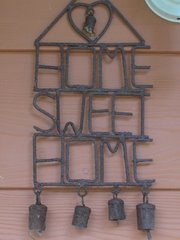
I couldn't resist it - especially with the lovely native plant borders. It'll be the first sewing project I've tackled in quite a while. I'd forgotten how much I enjoy sitting down and doing a bit of sewing... just needed some new inspiration!
 I've transferred the design to calico; picked out some threads and found a little tin to keep all my bits & pieces in, and I'm ready to go. It may take a while - but I'll post the finished pic one day soon.
I've transferred the design to calico; picked out some threads and found a little tin to keep all my bits & pieces in, and I'm ready to go. It may take a while - but I'll post the finished pic one day soon. It's fascinating to read the story about Dorothea Mackellar. Not unlike Beatrice Potter in alot of ways - quite a privileged life but a great deal of heartbreak and sadness too.
It's fascinating to read the story about Dorothea Mackellar. Not unlike Beatrice Potter in alot of ways - quite a privileged life but a great deal of heartbreak and sadness too.
For a brief history lesson in Australian literature when you have the time; here it is. Isobel Marion Dorothea Mackellar was born on 1 July 1885, at her family's home that stands on Point Piper, overlooking Rose Bay on Sydney Harbour. The third of four children, Dorothea was the only daughter born to renowned physician and Parliamentarian, Sir Charles Kinnaird Mackellar and his wife, Marion (nee Buckland). The young Dorothea received private tutoring in painting, fencing and languages and later attended lectures at the Sydney University though she never formally enrolled as a student. She spoke French, German, Italian and Spanish fluently. When the family travelled overseas, Dorothea acted as an interpreter for her father. | |
| Dorothea had a lively personality with a keen sense of humour, which is reflected in her diary entries of the early 1900's. Hers was a privileged life that was divided between the busy sophistication of the city and the simplicity of the country. | |
| The Mackellar family owned several properties in the Gunnedah area, including "Kurrumbede" and "The Rampadells" on the Blue Vale Road near Gunnedah. The late Mrs Maude Broun lived on the adjoining property, "Coulston", with her husband, the son of Sir Charles Broun. In a taped interview after Dorothea's death, Mrs Broun recalled the Mackellar's regular visits with Dorothea, Eric and Malcolm (her two remaining brothers, Keith having been killed in the Boer War at age 19), to their Gunnedah country residences. | |
| Sir Charles handed these properties over to his sons whom many still remember as well respected and generous members of our local community. Over the years Dorothea often visited the area, staying with her brothers and maintaining her skills as an ardent horsewoman. Dorothea was very proud of the fact that she could ride side-saddle so well, even in the bush. | |
| The first draft of what was to become Australia's most quoted and best loved poem, "My Country", was written in England at a time when Dorothea was feeling homesick. Never quite content with the verses, she wrote and re-wrote the poem several times after returning to Australia and living in the apartments above her father's consulting rooms in Buckland Chambers, Liverpool Street, Sydney, opposite the ANZAC Memorial. It is fitting that Dorothea's Memorial should now grace ANZAC Park in Gunnedah, depicting her as the young woman who wrote "My Country", and gazing in the direction of her beloved "Kurrumbede". | |
| Dorothea never married though, at 28 years of age, whilst living in London, she fell in love with an English poet named Patrick Chalmers. When she returned to Australia just before the start of World War I, she wrote to Patrick to let him know her parents approved of their decision to wed. Unfortunately, the letter was lost and Patrick married someone else. Dorothea was heartbroken, her poetry after this experience becoming more serious with sometimes tragic undertones. ("Sorrow") | |
| Dorothea continued to write and travel during the Twenties and early Thirties, her work appearing in journals of high repute such as the London "Spectator", American "Harper's Magazine" and the Sydney "Bulletin" among others. During these years, four volumes of verse were published, "The Closed Door", "The Witchmaid", "Dreamharbour" and "Fancy Dress". | |
| The Australian countryside continued to be a source of inspiration to Dorothea. Two poems that particularly reflect her special relationship with our district are; "Dawn" (At the dawning of the day; On the road to Gunnedah...), and "Burning Off" (They're burning off at the Rampadells; The tawny flames uprise...). | |
| Later in life Dorothea suffered increasing ill health and ceased to write. In the 1968 New Year Honours list her contribution to Australian literature was formally recognised and she was made an Officer of the British Empire. Sadly, only two weeks later on the 14 January, Dorothea Mackellar died in her sleep in the Scottish Hospital, Paddington. The funeral service was held in St Mark's Church at Darling Point where reportedly Dorothea's favourite poem, "Colour" was read. She was once recorded saying about the poem, "You know, I think that was as close as I ever came to writing poetry." She was laid to rest in the family vault at Waverley Cemetery in Sydney. | |
| Dorothea's brothers predeceased her, leaving no heirs, therefore Dorothea was the last of that branch of the Mackellars. (Information from http://www.infogunnedah.com.au/tourism/dorothea.php) |









No comments:
Post a Comment